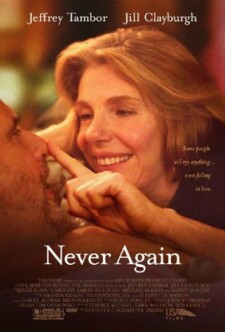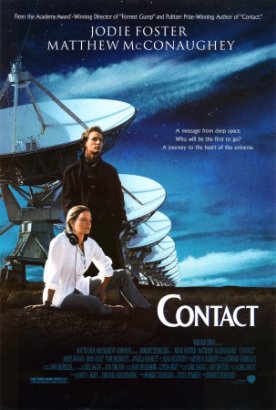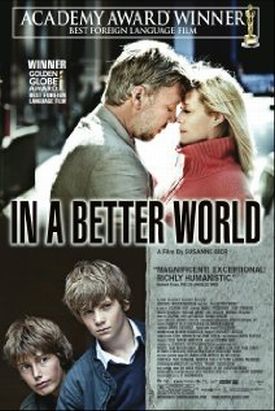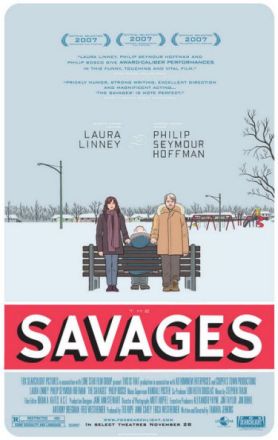Never Again
Watching Never Again, written and directed by Eric Schaeffer, is like watching an episode of “Sex and the City” only with old and unattractive people. Or at least (as always in the movies) relatively unattractive people. The older couple, Christopher and Grace (Jeffrey Tambor and Jill Clayburgh) know that they are, if not unattractive at least rather old for the dating scene, and Miss Clayburgh comments in a witty, post-modern way, that she knows of “no movie about a woman over 35 who’s interested in sex who doesn’t get decapitated.”
There are other funny moments, particularly when Grace is surprised by Christopher and his overbearing mother while trying on a sex toy. Yet being interested in sex and being the kind of woman who seems to think it a sign of feminist authenticity (or something) to announce to the world that “I need to get laid” are not necessarily equally prepossessing qualities, particularly in a woman in her 50s. Oughtn’t she to have progressed beyond the youthful view that sex is therapeutic and identity and meaning in life are all bound up with whom one is sleeping with, what kind of sex one is getting and whether or not the sex and the meaning might both be better with somebody new?
On Christopher’s side the contrast between age and attitude is even more bizarre. For some reason, after a lifetime of heterosexuality, he has taken it into his head that he might be gay and so decides to try a homosexual relationship. The comedy of his failure, and of his initial belief when he meets Grace in a gay bar that she is a transsexual, is pretty feeble, but it does do two things that American movies like to do these days: it shows familiarity with and tolerance of “the gay lifestyle” and also enthusiastically embraces that lifestyle’s central assumption and belief on behalf of heterosexuals, which is that as much sex as possible is not only healthy but more or less necessary.
Not altogether surprisingly, the course of true love doesn’t run smooth as — what do you think? — even these old folks prove to be commitment-phobic, an ailment which is to our times what tuberculosis was to the Romantics and, to those who romanticize it, equally obscure. Let’s see, here you have datum one: commitment-phobia, male and female versions, both acute, and there you have datum two, a celebration of recreational and therapeutic sex for both sexes and all sexual orientations. Yet somehow no one ever thinks to connect the two. An occasional sense of ironic distance, the merest hint of a doubt about the unquestioned virtues of self-indulgence would have done the world of good for this movie.
For one brief moment during the psycho-babbling tirade that Christopher’s case of commitment-phobia inspires from poor Grace (even though she is suffering from it herself), you think that Mr. Schaeffer may be capable of making a joke at his own expense. Surely dear sweet Grace cannot be spouting such stuff from her creator’s overworked pen — stuff about the “power-tripping male ego” and “the madonna-whore thing” and the “wise, Zen thing” that Christopher seems foolishly to expect from her because he doesn’t “know how I’m feeling” — and still expect to be taken seriously?
But, alas, she does. Or at least Mr Schaeffer does on her behalf. Somehow he manages to look like stout Cortez with wild surmise on the discovery that both she and her boyfriend are afraid of intimacy and to regard himself as a great discoverer. In somewhat the same spirit he has Grace say to Christopher’s sidekick, Earl (Bill Duke): “Love’s the easy part. . . It never has anything to do with whether two people can stay together.” What? Never? This is obviously a woman who, like the promiscuous 30-somethings of “Sex in the City,” thinks of love as being solely a matter of feelings. In a woman of her age this is much more scandalous than her being seen in public in a strap-on dildo.
Discover more from James Bowman
Subscribe to get the latest posts to your email.








